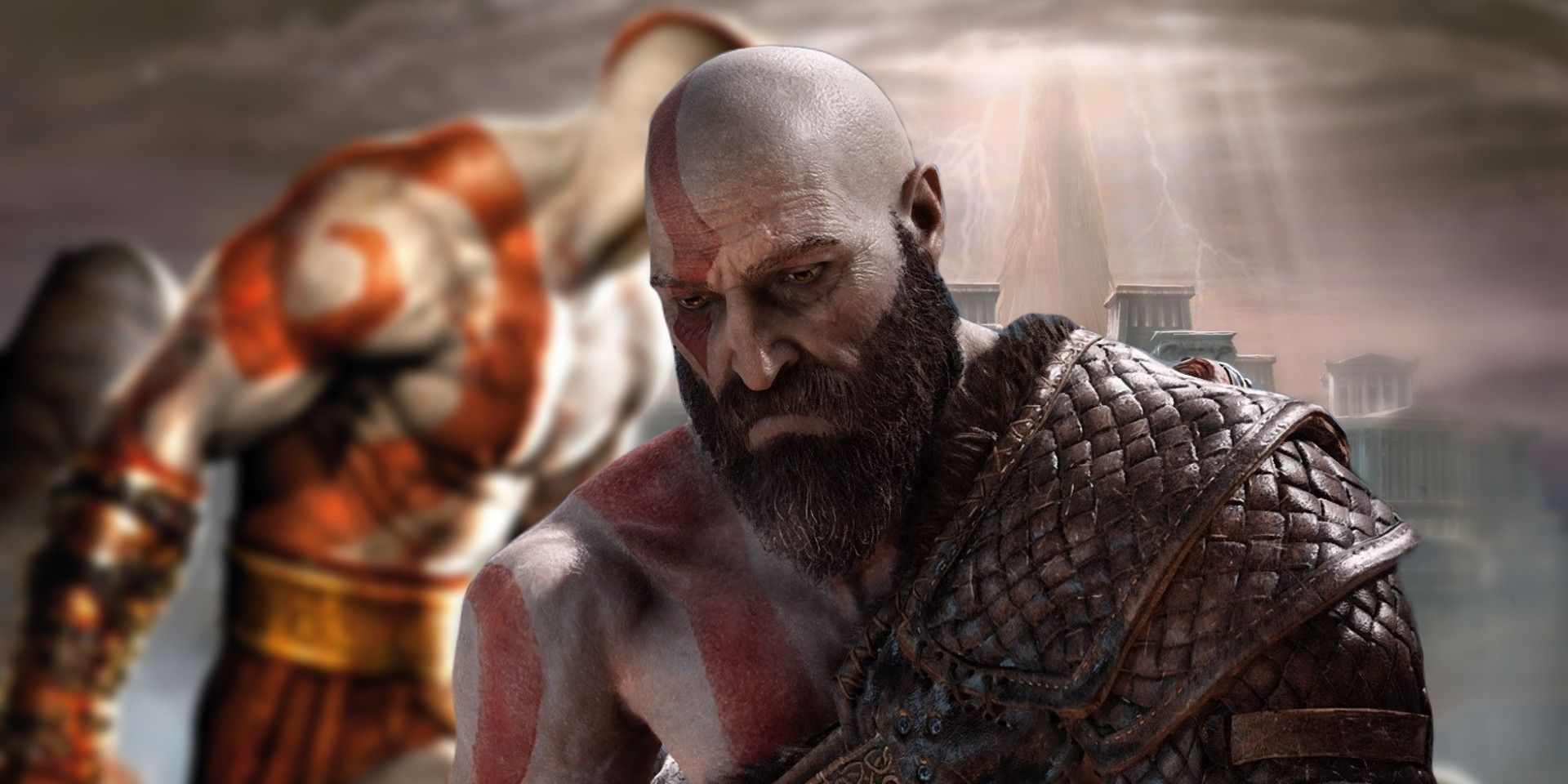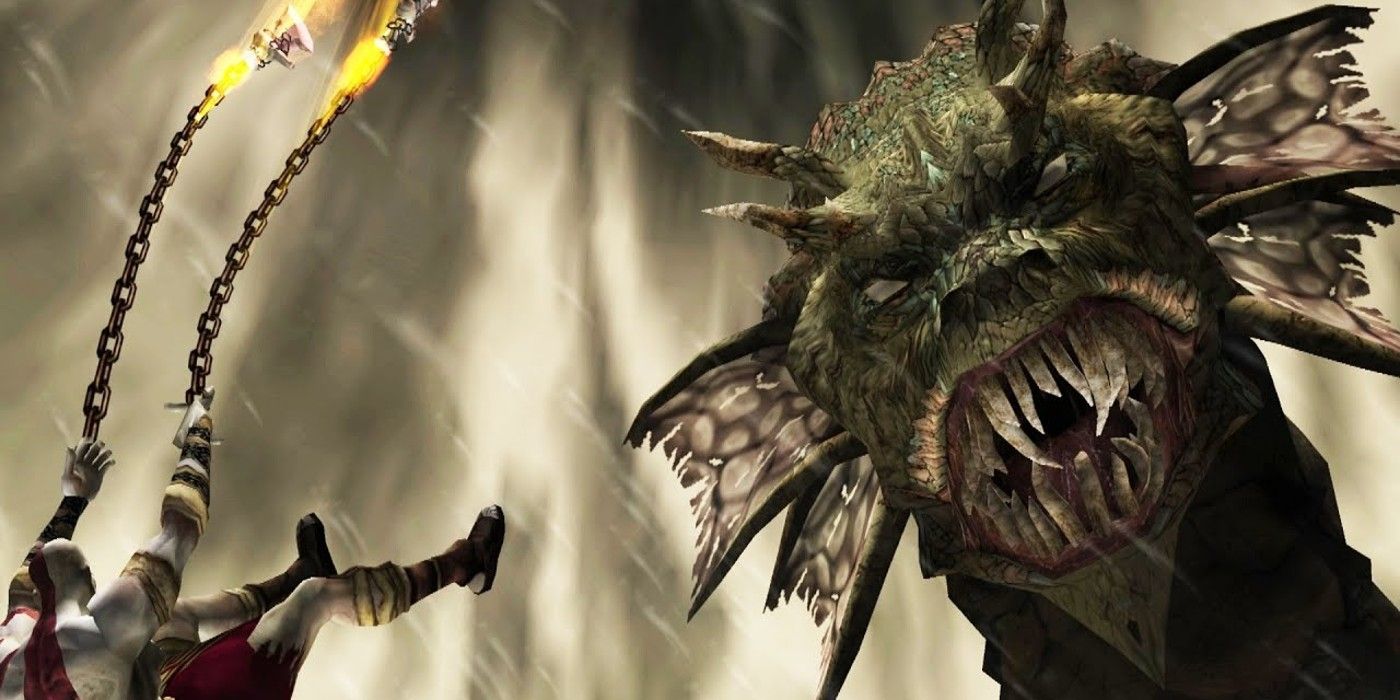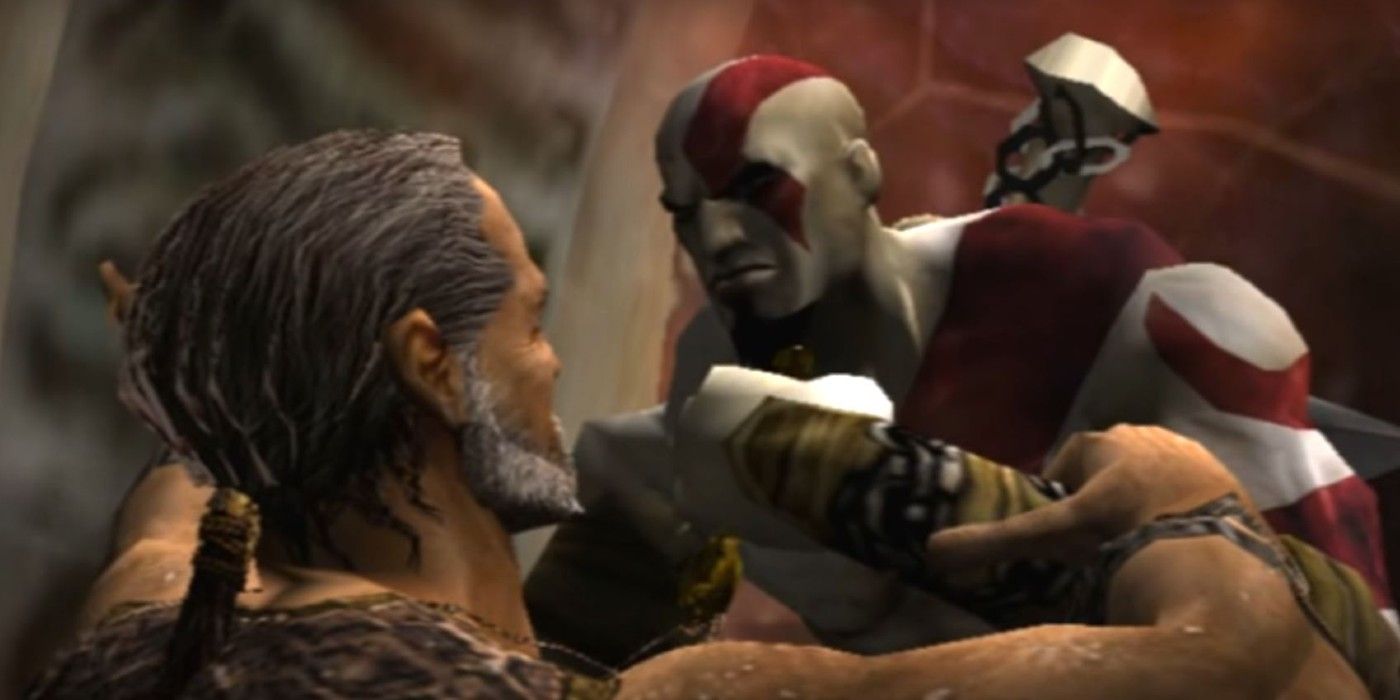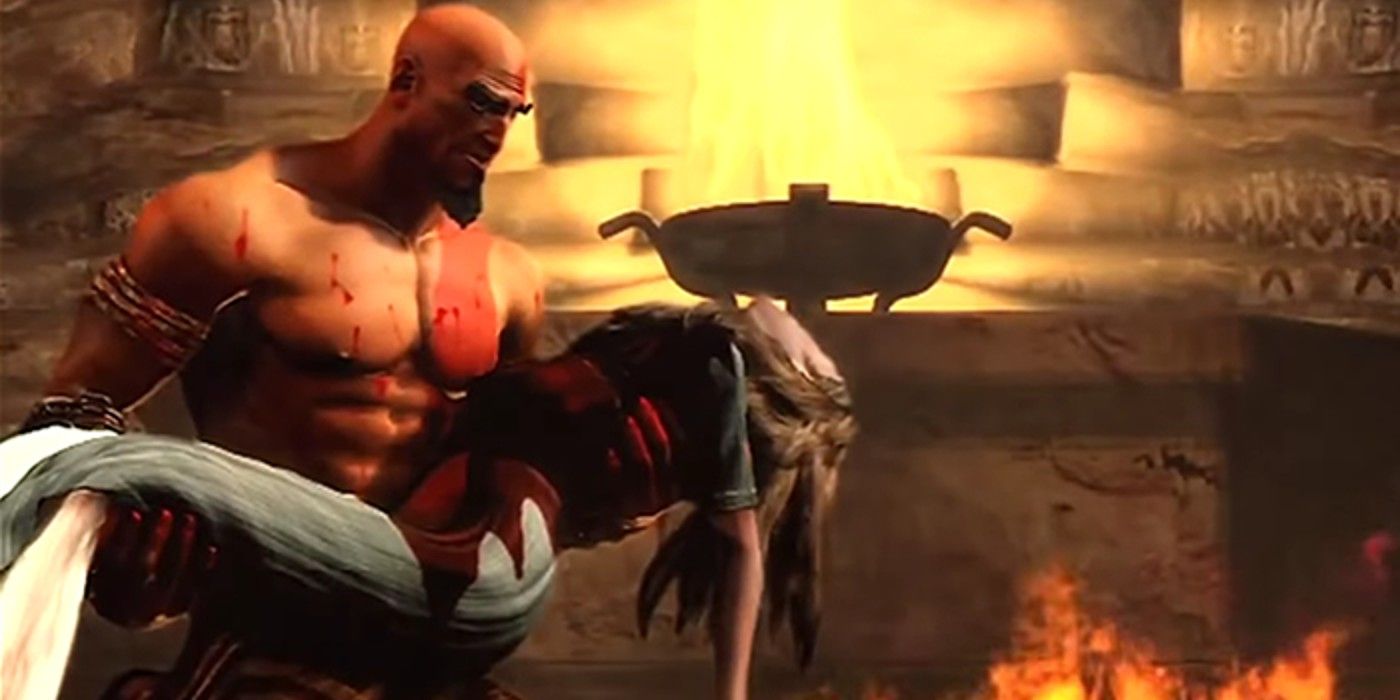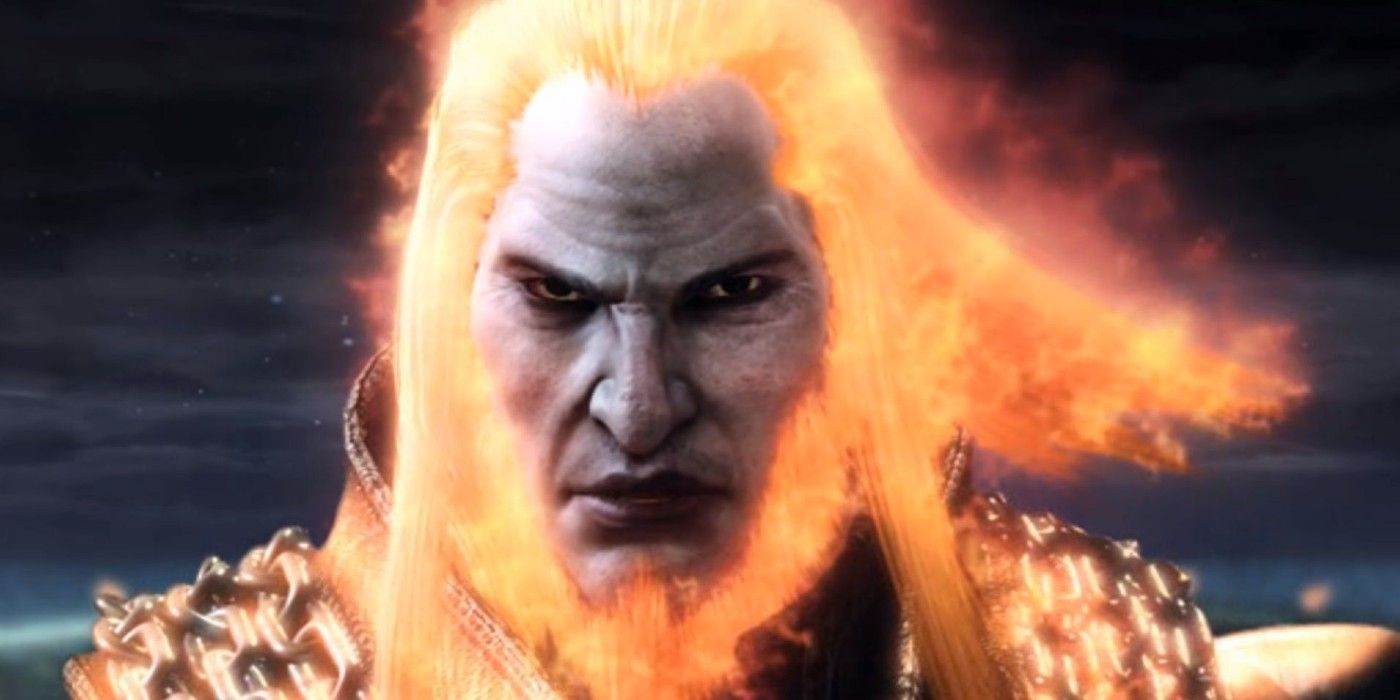God of War follows the vengeance-driven Kratos and his horrible murders, and the ones he remembers committing before the first God of War game's beginning. Although the games grew to be extremely graphic as the series progressed, there are still plenty of horrible murders that Kratos commits in the first God of War. Kratos' horrible murders aren't just defined by their graphic images, however, but by what drives him to commit these heinous acts.
Whether he intends to cause pain or not, Kratos is far from a merciful killer. There are several times throughout the first God of War where Kratos causes anyone who comes across his path to suffer as they die, regardless if they were deserving or not. Kratos' most horrible murders in the first God of War game are graphic, unprecedented, and have dire consequences for later in the series.
The first God of War has four defining parts where Kratos commits horrible murders. His battles against the Hydra and Ares show how merciless and vengeance-driven Kratos is. Kratos' multiple encounters with the Ship Captain are odd parts of God of War, but they show that even though he has remorse for his past he has not changed. His recollection of memories before and during the time Kratos served Ares show that Kratos was a monster.
God Of War: Kratos Murders The Hydra
At the beginning of God of War, Kratos is assigned by Poseidon to kill the Hydra. The Hydra is a multi-headed sea serpent that has attacked a fleet of ships at sea, completely ravaging the fleet and leaving the crew stranded across the wreckage. In the final battle against the Hydra, Kratos fights the two smaller heads and the boss head Hydra at the same time.
After weakening the two smaller heads, Kratos climbs the ship's cargo to reach hanging platforms with metal spearheads fastened beneath them. As Kratos reaches the platforms, they fall into the necks of the smaller Hydra. Although still alive, they are impaled and stuck in place thanks to the weight of the spearheads. The crescent tops of the spearheads prevent the Hydra from being able to retreat without being ripped apart.
As the battle continues against the boss head of the Hydra, Kratos repeatedly slams the Hydra into the ship's mast. The player must repeatedly tap the circle button after Kratos impales the boss head with the Blades of Chaos in God of War to slam it back down into the ship until the mast partially breaks. As the Hydra is beaten to its last third of health, Kratos jumps on the head and impales the Hydra with one of the blades in its left eye. Kratos then leaps from the boss' head, catching it with both blades as he descends to the ship's deck. As the Hydra tries to retreat, Kratos is pulled up and catches himself by planting his feet on the side of the crow's nest.
The player is prompted to repeatedly press the circle button to bring the Hydra down, impaling it one final time on the broken mast of the ship. The Hydra struggles to get free, but Kratos' strength is too strong for the Hydra to beat. The boss head of the Hydra finally bleeds out, and as Kratos retracts the Blades of Chaos, he looks to the right and left smaller heads to see them burst. The Hydra dies painfully and slowly, making it one of the worst murders Kratos commits in God of War.
God Of War: Kratos Murders The Ship Captain
After Kratos kills the Hydra in the first God of War, he travels inside the mouth of the boss' head in search of a key. The key will allow him to unlock the door beneath the ship where unarmed women were locked away before the undead soldiers started to attack. The key was worn like a necklace around the Ship Captain's neck, who was swallowed by the head Hydra before Kratos killed it. Shortly after entering the mouth, Kratos finds the Ship Captain alive and attempting to crawl up the long neck.
In this cutscene, Kratos originally grabs the Ship Captain by the shoulders to pull him up. Even with Kratos' strength, it's apparent that the Ship's Captain is too slippery to grasp as Kratos loses his grip. As the Ship Captain begins to fall down the Hydra's throat, Kratos grabs him by the key hanging around his neck. Kratos grabs the Ship Captain's left wrist to pull him up further. The Captain says to Kratos, "Thank the Gods you came back for me!" Kratos looks into the captain's eyes and says, "I didn't come back for you!" He then rips the key necklace off of the Ship Captain and lets him fall to his death inside the Hydra.
Much later on in the game, Kratos encounters the Ship Captain again in another cutscene. After finding Pandora's Box and being impaled by Ares, Kratos dies and is sent to the River Sticks in Hades. Unwilling to accept his fate, Kratos grabs a man who is hanging from the spine of a large dead animal by the legs. This prevents Kratos from falling into the River Sticks. The man yells, "Let go fool! You won't drag me down to that cursed river!" Then, Kratos replies, "There is a task left for me above. I will see it completed," as he impales the man with one of the Blades of Chaos.
Kratos uses the blade in God of War to climb up the man's back to the ledge. Although the man gasps, he is already dead so the blade doesn't permanently affect him. Once Kratos reaches the vertebra and stands up, the man grabs Kratos by the ankle. Kratos turns around to look the man in the eyes as the man screams, "YOU again?!" Subtitles reveal it earlier in the cutscene, but the man Kratos latched onto was the Ship Captain from before. Without hesitation or remorse, Kratos shakes the Ship Captain off of his ankle and kicks him in the face. The Ship Captain falls into the River Sticks after having his fate sealed for the second time by Kratos, making Kratos' initial murder of the Ship Captain seem even more terrible.
God Of War: Kratos Murders Civilians
Throughout flashbacks in cutscenes, Kratos is reminded of the atrocities that he committed in his own conquest and in the name of Ares alike. The memories that Kratos sees as the Oracle of Athens enters his mind reveal that Kratos was much more ruthless before the first events of God of War. Before becoming a servant of Ares, Kratos would murder his enemies by decapitation, smashing their heads into large rocks, and impaling them through the neck with his sword.
After becoming a servant of Ares, Kratos ventures to a number of locations in Greece where Athena is worshipped. Jealous of his sister's favor from their father Zeus, Ares sends Kratos on a number of pursuits to kill anyone who worships Athena. Kratos murders unarmed worshipers with the Blades of Chaos by impaling their chests, assassinating them from behind, and swinging the blades around by chains seared into his forearms.
In a final outburst of rage in the name of Ares, Kratos in the first God of War brings his Spartans to one final raid on an Athenian village. In this raid, Kratos' instincts tell him not to enter one particular Temple. Additionally, a feeble old Oracle warns Kratos not to enter the Temple saying, "Beware Kratos. The dangers in the Temple are greater than you know." Choosing to ignore the Oracle's warning, Kratos moves her aside and enters the Temple. He begins cutting down each of the unarmed worshipers one by one as the smoke inside the Temple thickens.
Finally, Kratos reaches the last two civilians inside the Temple. Even though all he can see are their silhouettes, he slashes them without hesitation. As the smoke clears from the room Kratos sees that he has murdered his wife and daughter, spilling their blood violently across the Temple floor, making for arguably the most vicious murder Kratos commits in the game.
God Of War: Kratos Murders Ares
In the final battle of God of War against Ares, Kratos defeats the God of War and brings him to his knees. During the battle's final cutscene, Kratos delivers a swift final blow to Ares's heart. The God of War stumbles a bit more, nearly collapsing from his knees to the ground. After regaining what little strength he has left, Ares lets out a deep roar as blood begins to rush out of his chest. Ares finally collapses to the ground and his body explodes.
Upon Ares' death, the explosion creates a massive tidal wave. Although never confirmed, it is unclear whether or not the tidal wave reached the shores of Athens and flooding what was left of the city and its inhabitants. The cutscene fades to black and back to Athens as the God of War narrator says, "The city had been saved, and would thrive again. The same could not be said for Kratos."
Kratos returns to Athena, requesting that his nightmares finally be erased from his memory. "Athena, rid me of the memories that haunt me still," says Kratos in the cutscene. "You have done well Kratos," says Athena, "We promised your sins would be forgiven, and so they are. But we never promised to take away your nightmares. No man, no God could ever forget the terrible deeds you have done." A somber look befalls Kratos' face, as he realizes that his quest for vengeance would not make up for what he had done. Feeling abandoned by the gods, Kratos attempts to take his own life in the same cutscene that started God of War, making Kratos feel more like a sympathetic character now. As Kratos plunges himself into the Aegean Sea, the gods forbid him from dying and bring him to Olympus to take the empty throne as the new God of War.
The narrator implies that Kratos is the reason for war after he becomes the new God of War by saying, "Whenever men rode forth to battle for good cause or for evil, they did so under the watchful eye of a God. They were driven forward by Kratos." Since Kratos murdered Ares at the end of God of War, he has to live with the knowledge that he is responsible for wars to come. This is further supported in God of War through the final cutscene that shows brief glimpses of the various wars that have occurred throughout history while this dialogue is dictated by the narrator.

